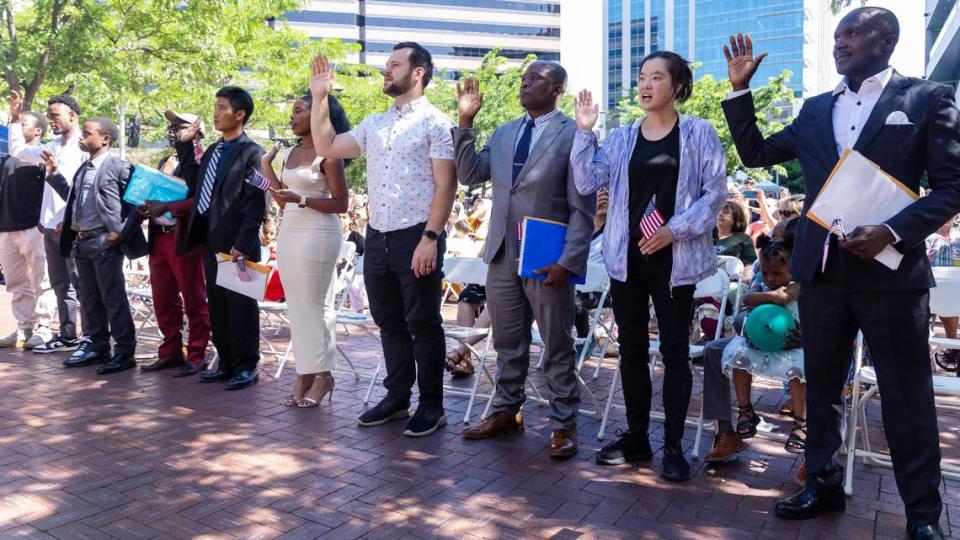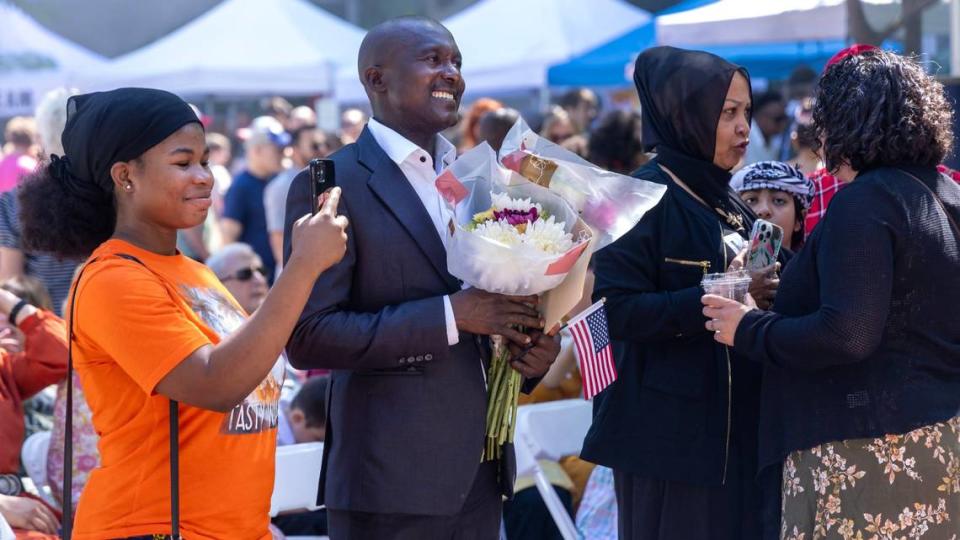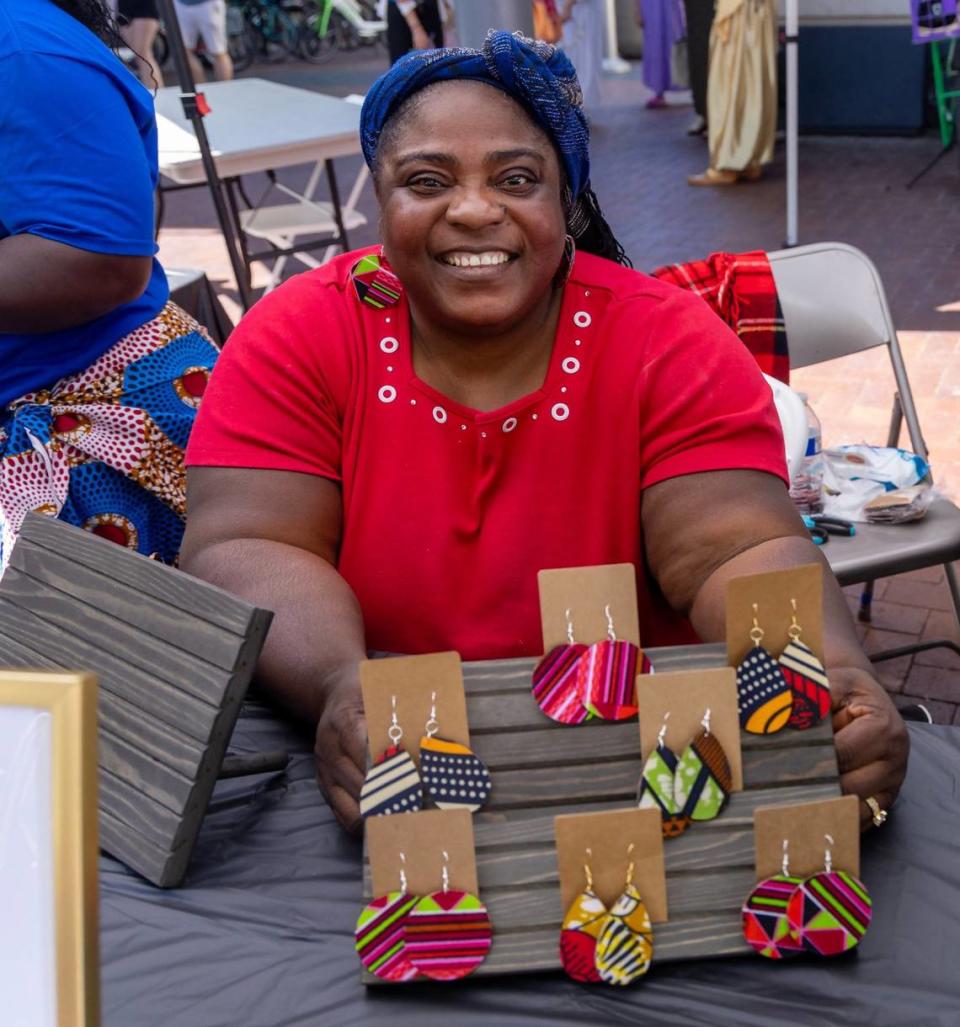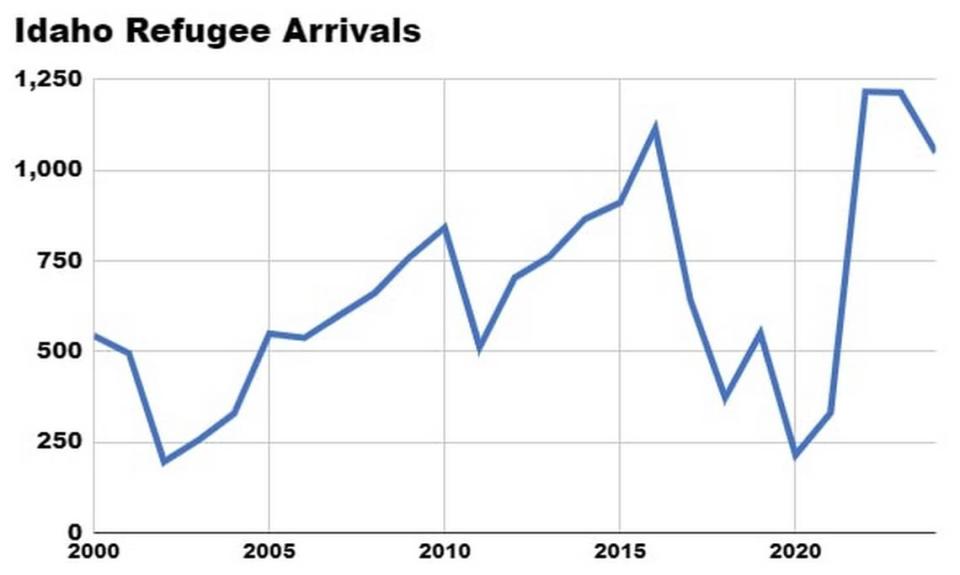Refugees fled conflict & violence before coming to the U.S. They’ve found a home in Idaho
Tresor Uchama and Enock Keju sat patiently on white plastic chairs on Saturday as the sun beat down, waiting to take part in the final step of their nearly decade-long journey to becoming American citizens.
Uchama had left the Democratic Republic of the Congo to avoid conflict and raised Keju in Uganda before they came to the United States as refugees.
“My parents wanted a better life for their children,” Keju, 19, said in an interview. “(And a) better opportunity for our future.”

After seven years of waiting, Keju and Uchama raised their right hands alongside eight other refugees from Burundi, Thailand, Ukraine, Myanmar, Congo and the Central African Republic, and swore the oath of allegiance to become American citizens.
The event was held during a World Refugee Day event at the Grove Plaza and Capital City Public Market, with the smell of hot food wafting around and cheers from hundreds of attendees.
Uchama said he was happy to be able to take part in the event.
“I’m grateful,” Uchama said. “It’s been amazing.”

Home in Idaho
Those in attendance included both those who had recently arrived in Boise as refugees and those who had already gone through the citizenship process and wanted to show support.
Neville Mutombo, who was born in a refugee camp in Zambia after his parents fled conflict in Congo, moved to Boise in February with three of his family members.
Mutombo said life in Zambia was restricted and that he wasn’t always allowed to speak his native language.
“You are restricted. You have to adapt to their language,” Mutombo told the Idaho Statesman. “It was very difficult.”
Mutombo was a teacher in Zambia and said he’d found a job tutoring math at the College of Western Idaho.
“(It feels) very nice to chat to the students, to talk to them, to get to know them,” Mutombo said.

Like many others, Rachel Julugbeh came to Idaho in search of a way out of the refugee camp that she had lived in for 14 years.
Julugbeh moved from Liberia to Boise in 2003, became a citizen in 2009 and attended the event to support other refugees who had found a safe haven in Boise.
She said she had experienced the long road to citizenship and knew what it was like for others who had to leave their own countries.
“It’s a horrible feeling,” Julugbeh said.
There was a lot of change moving from Liberia to Boise because she couldn’t do many of the things she was used to doing in Liberia, she said.
“(But) life is all about change,” Julugbeh said. “You got to get used to the feeling.”
Julugbeh sold earrings during the citizenship event to raise money to build a library in Liberia and said she has loved living in Idaho.
“I’ve been here for almost 20 years and I love it,” she said. “I really love it here.”

Idaho welcomes thousands as global refugee crisis worsens
The 10 refugees who took part in Saturday’s event were just a tiny sliver of the thousands of refugees in Idaho.
Since 2000, the state has welcomed more than 15,600 refugees with just over 1,000 projected for fiscal year 2024, according to the Idaho Office for Refugees. That’s about on par with the number of arrivals in 2023 and 2022, but up from the four years from 2016 through 2020.
Holly Beech, communications manager for the Idaho Office for Refugees, said that restrictions put in place by then-President Donald Trump had lowered the numbers of refugees, then an even bigger drop came when the COVID-19 pandemic hit.
The number started to climb again when the Taliban captured control of Afghanistan after the U.S. military pulled out in 2021 and when Russia invaded Ukraine in 2022.
“It’s been a kind of interesting five years,” Beech said.

While the number of refugees has gone up over the past few years, Beech said they spend a lot of time thinking about resettlement numbers to make sure they don’t overwhelm local resettlement agencies and welcome centers.
In fiscal year 2023, 558 refugees arrived in Idaho from Congo, 292 from Ukraine and 132 from Afghanistan.
Congo has been the largest country of origin in recent history for Idaho, with the state welcoming nearly 3,000 refugees between 2000 and 2022.
“It’s just constant,” said Beech.
The country has seen decades of conflict between armed groups, widespread violence, epidemics and food insecurity, according to the Office of the United Nations High Commissioner for Refugees, or UNHCR. 700,000 people were displaced within Congo in 2023, ratcheting up the total number of those who have been forced to leave their homes but stayed in the country to 6.2 million.
More than one in every 69 people worldwide have been forcibly displaced from their homes, with about 43.3 million refugees worldwide at the end of 2023, according to the UNHCR. The number of refugees has tripled in the last decade.
Beech said that many of the refugees who have found a home in the Treasure Valley have been through devastating trauma — but that the World Refugee Day citizenship event is a celebration. It’s a reminder that there’s still life and beauty after going through those experiences.
“It’s an opportunity for people to start again,” Beech said.
The Boise area’s population has boomed. So why are so many school enrollments falling?
Micron expansion could create 15k jobs. Where is everyone going to live? Here’s an idea
Boise development would add 3,500 homes. Why staff analysts say it’s a bad deal
What’s going on with all the traffic, road closures in downtown Boise? What to know


